Related Research Articles

Annie Besant was a British socialist, theosophist, freemason, women's rights and Home Rule activist, educationist, and campaigner for Indian nationalism. She was an ardent supporter of both Irish and Indian self-rule. She became the first female president of the Indian National Congress in 1917.

Dadabhai Naoroji, also known as the "Grand Old Man of India" and "Unofficial Ambassador of India", was an Indian Independence activist, political leader, merchant, scholar and writer who served as 2nd, 9th, and 22nd President of the Indian National Congress from 1886 to 1887, 1893 to 1894 and 1906 to 1907.

Allan Octavian Hume, CB ICS was a British political reformer, ornithologist, civil servant and botanist who worked in British India and founded the party Indian National Congress. He supported the idea of self-governance by Indians. A notable ornithologist, Hume has been called "the Father of Indian Ornithology" and, by those who found him dogmatic, "the Pope of Indian Ornithology".
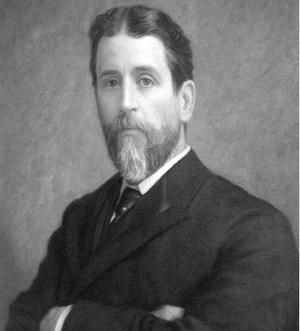
William Digby was a British author, journalist and humanitarian.

Shyamji Krishna Varma was an Indian revolutionary fighter, an Indian patriot, lawyer and journalist who founded the Indian Home Rule Society, India House and The Indian Sociologist in London. A graduate of Balliol College, Krishna Varma was a noted scholar in Sanskrit and other Indian languages. He pursued a brief legal career in India and served as the Divan of a number of Indian princely states in India. He had, however, differences with Crown authority, was dismissed following a supposed conspiracy of British colonial officials at Junagadh and chose to return to England. An admirer of Dayanand Saraswati's approach of cultural nationalism, and of Herbert Spencer, Krishna Varma believed in Spencer's dictum: "Resistance to aggression is not simply justified, but imperative".
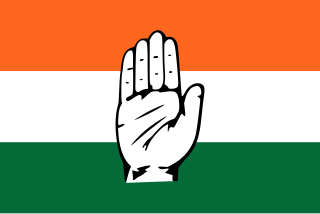
The Indian National Congress was established when 72 representatives from all over the country met at Bombay in 1885. Prominent delegates included Dadabhai Naoroji, Surendranath Banerjee, Badruddin Tyabji, Pherozeshah Mehta, W. C. Banerjee, S. Ramaswami Mudaliar, S. Subramania Iyer, and Romesh Chunder Dutt. The Englishman Allan Octavian Hume, a former British civil servant, was one of the founding members of the Indian National Congress.
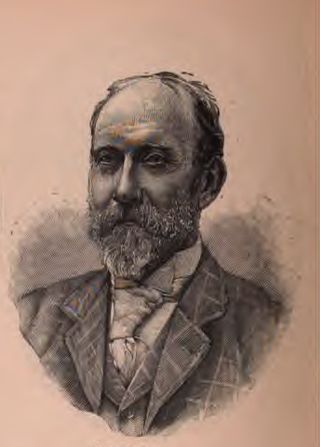
Sir William Wedderburn, 4th Baronet, JP DL was a British civil servant and politician who was a Liberal Party member of Parliament (MP). Wedderburn was one of the founding members of the Indian National Congress. He was also the president of Congress in 1889 and 1910, for the Allahabad session.
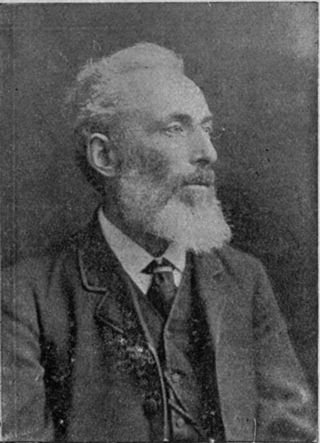
Alfred John Webb was an Irish Quaker from a family of activist printers. He became an Irish Parliamentary Party politician and Member of Parliament (MP), as well as a participant in nationalist movements around the world. He supported Butt's Home Government Association and the United Irish League. At Madras in 1894, he became the third non-Indian to preside over the Indian National Congress.
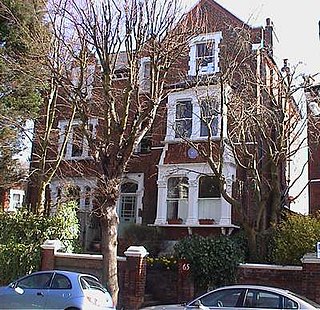
India House was a student residence that existed between 1905 and 1910 at Cromwell Avenue in Highgate, North London. With the patronage of lawyer Shyamji Krishna Varma, it was opened to promote nationalist views among Indian students in Britain. This institute used to grant scholarships to Indian youths for higher studies in England. The building rapidly became a hub for political activism, one of the most prominent for overseas revolutionary Indian nationalism. "India House" came to informally refer to the nationalist organisations that used the building at various times.
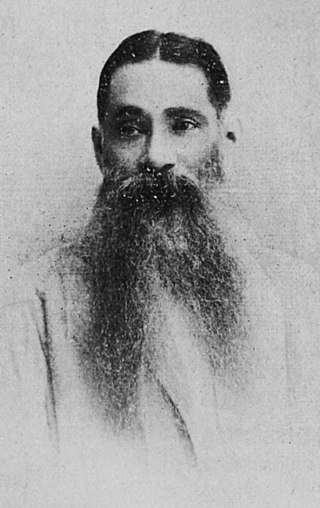
Womesh Chunder Bonnerjee (or Umesh Chandra Banerjee was an Indian Independence activist, and barrister who practiced in England. He was a secretary of the London Indian society founded by Dadabhai Naoroji in 1865. He was a co-founder and the first president of Indian National Congress in 1885 at Bombay, served again as president in 1892 at Allahabad. Bonnerjee financed the British Committee of Congress and its journals in London. Along with Naoroji, Eardley Norton and William Digby he started the Congress Political Agency, a branch of Congress in London. He unsuccessfully contested the 1892 United Kingdom general election as a Liberal party candidate for the Barrow and Furness seat. In 1893, Naoroji, Bonnerjee and Badruddin Tyabji founded the Indian Parliamentary Committee in England.
The Indian Home Rule Society (IHRS) was an Indian organisation founded in London in 1905 that sought to promote the cause of self-rule in British India. The organisation was founded by Shyamji Krishna Varma, with support from a number of prominent Indian nationalists in Britain at the time, including Bhikaji Cama, Dadabhai Naoroji and S.R. Rana, and was intended to be a rival organisation to the British Committee of the Indian National Congress that was the main avenue of the loyalist opinion at the time.
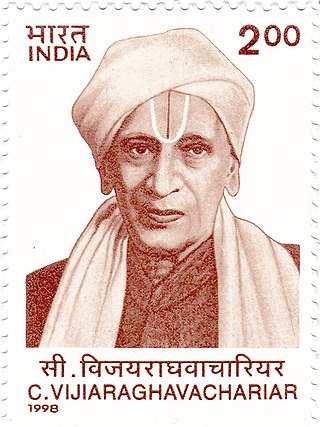
Chakravarti Vijayaraghavachariar was an Indian politician. He rose to prominence following his appeal against the false charges alleging him to have instigated a Hindu – Muslim riot in Salem. The legal battle and eventual victory in proving his innocence earned him the title The Lion of South India.

Eardley John Norton was a Madras barrister, coroner and politician of British origin. He was also one of the earliest members of the Indian National Congress and a champion of civil liberties and rights of the Indian people.

Dadabhai Naoroji Road (D.N.Road), a North–South commercial artery road, in the Fort business district in South Mumbai of Maharashtra, India, is the nerve centre of the city, starting from the Mahatma Phule Market ,linking Chhatrapati Shivaji Maharaj Terminus, leads to the Hutatma Chowk at the southern end of the road. This entire stretch of the road is studded with Neo–Classical and Gothic Revival buildings and parks built in the 19th century, intermingled with modern office buildings and commercial establishments.

The Indian Councils Act 1892 was an Act of British Parliament that introduced various amendments to the composition and function of legislative councils in British India. Most notably, the act expanded the number of members in the central and provincial councils. For example, the number of additional members elected to the Governor-General's council was increased from twelve to sixteen members of whom – as per the Indian Councils Act 1861 – not less than half were to be non-officials, i.e. persons not in the civil or military service of the Crown. The Governor-General was empowered to invite different bodies in India to elect, select or delegate their representatives and to make regulations for their nomination.
The London India Society was an Indian organisation founded in London in March 1865 under the leadership of Dadabhai Naoroji and W.C. Bonnerjee. The purpose of the organisation was to promote awareness of the rising Indian social and political aspirations in England, and to raise the profile of India related matters amongst the British public. The London Indian Society was superseded by the East India Association, which was founded by Dadabhai Naoroji in 1866.
The Early Nationalists, also known as the Moderates, were a group of political leaders in India active between 1885 and 1907. Their emergence marked the beginning of the organised national movement in India. Some of the important moderate leaders were Pherozeshah Mehta and Dadabhai Naoroji. With members of the group drawn from educated middle-class professionals including lawyers, teachers and government officials, many of them were educated in England.
Perin Ben Captain (1888–1958) was an Indian freedom activist, social worker, and the grand daughter of renowned Indian intellectual and leader, Dadabhai Naoroji. The Government of India honoured her in 1954 with the award of Padma Shri, the fourth highest Indian civilian award for her contributions to the country, placing her among the first group of recipients of the award.
The Welby Commission was a group set up by the British Government to investigate wasteful spending in India. Established in 1895, its official name was the Royal Commission on the Administration of Expenditure of India.

Sri Ram Mehrotra was an Indian professor of history who published on the history of the Indian independence movement, the Indian National Congress, the life and work of its founder Allan Octavian Hume, and on the writings and philosophy of Gandhi. He also wrote a biography of Pranjivan Mehta, an important but little-known influence in the Indian independence movement who supported Gandhi. Mehrotra was known for his meticulous detail to sources and care in interpretations and published several annotated collections of sources and letters relating to Hume and towards the end of his life, Dadabhai Naoroji.